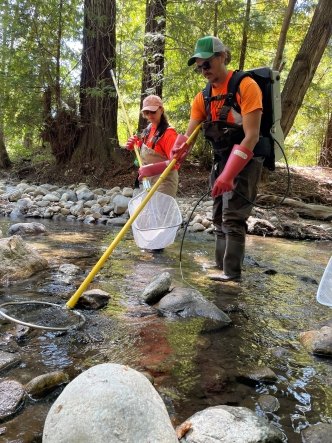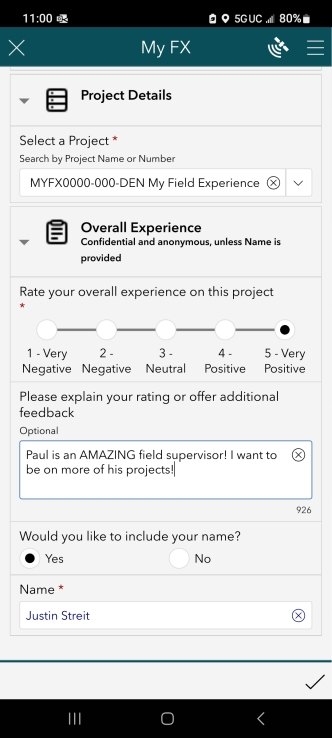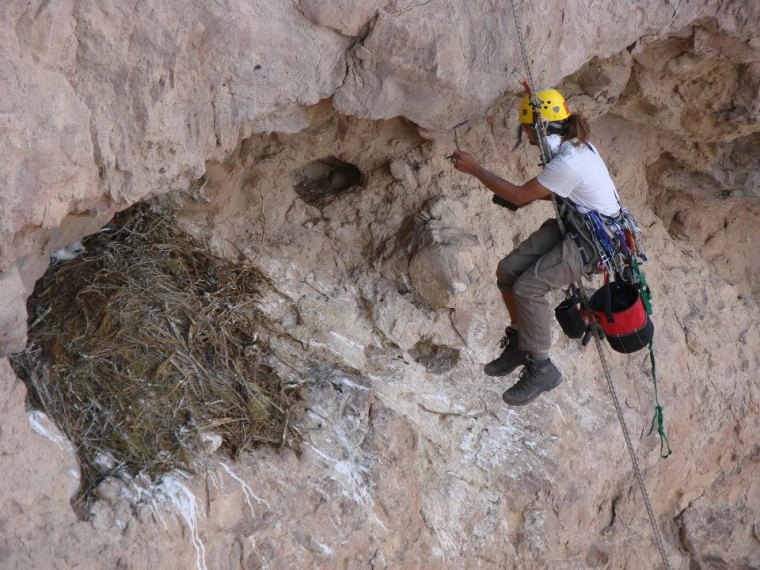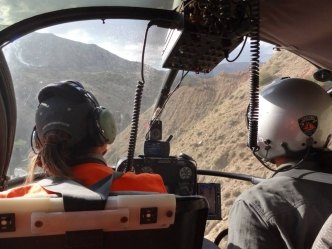At SWCA, our commitment to creating the best workplace drives us to consistently seek employee input and evaluate company practices. Through this ongoing process, we recognized the importance of providing more targeted support for our field employees, who are essential to our operations. As a result, in late summer 2023, we created two new positions specifically aimed at enhancing the engagement and support of our people who work in the field.
We recently sat down with Justin Streit, who was selected for the role of Senior Natural Resources Technical Director of Field Services, to talk about what he’s been doing in the first eight months of the role and how he’s partnering with our natural resources colleagues to improve the field experience.
Q: Why were you initially interested in this newly created position?
 Hanging out with a golden eagle nestling in southern Nevada as part of a Mojave Desert-wide prey study
Hanging out with a golden eagle nestling in southern Nevada as part of a Mojave Desert-wide prey studyJustin: Frankly, I wasn’t sure I was interested at first. The position felt unknown to me, but as I started having conversations with leaders across the company about the priorities and goals of this position, the more I became intrigued. I realized that the role is a strong blend of technical expertise and mentorship of junior employees, which has always been important to me and something that I’ve found a lot of value in over the years.
I have nearly 20 years of natural resources experience, from beginning my career as a field technician to leading field crews and surveys for various offices and projects, so being able to translate that experience into an official technical leadership role became really appealing to me. I was also ready for a new type of challenge when it came to my own professional growth. I love SWCA, I love working for this company, so to be able to go after a new role that could leverage my strengths and challenge me while staying at the company that I really value was a big benefit in my eyes. So, I applied, and after a competitive interview process, here I am today.
Q: What were your top priorities as you started in this position?
 Electrofishing with the Big Sur crew (Assistant Staff Biologist Nina Jackson in photo) as part of a fish relocation project (photo credit Project Biologist Kat Calderala)
Electrofishing with the Big Sur crew (Assistant Staff Biologist Nina Jackson in photo) as part of a fish relocation project (photo credit Project Biologist Kat Calderala)Justin: This position is focused on engagement with our natural resource’s employees in the field. To me, that means connecting with our field staff as much as possible in person, simply listening and being open to fresh perspectives. Not bringing any preconceived notions of how I think the field experience can be better for our employees but aiming to understand what our employees see as the real issues and what needs to be better.
I’ve been traveling to a lot of different offices already, spending time with folks out in the field, listening and conversing about what’s going well and what could be better, and then relaying those ideas back to our leadership in a way that’s collaborative and meaningful. So far, I’ve been to 11 offices located in Massachusetts, Maine, Colorado, Arizona, New Mexico, Nevada, and California.
Q: What are you hearing from our natural resources field employees?
Justin: Generally, people really like working for SWCA. It’s refreshing to hear that so consistently.
One of the areas where I’m hearing constructive feedback stems from post-Covid times with more employees than ever working remotely or hybrid. SWCA is incredibly supportive of workplace flexibility, but that also limits the opportunities to connect with managers and leaders in that organic way that just happened naturally when we all went to the office every day. This isn’t unique to the field teams or SWCA in particular; it’s an aspect that all organizations need to figure out. And that’s what we’re going to do—figure out what works best to facilitate more connection and mentorship opportunities for our field employees.
Q: What items have you been working on to help improve the field experience for our natural resources (and cultural resources) folks?
 SWCA’s My Field Experience Feedback Form on Mobile
SWCA’s My Field Experience Feedback Form on MobileJustin: Since you last spoke with Paul Burnett, we continue to make strides in several areas. For one, it’s important we acknowledge our field staff more and make sure that we demonstrate that we know how much value they bring to our organization. SWCA created and launched a quarterly “North Arrow Excellence in Field Services” award to recognize our outstanding field employees. Our teammates who do field work are the real base of everything we do at SWCA, so acknowledging those who exemplify what it looks like to be a great field employee is paramount. We’re looking at employees who not only live our company core values, but lead the way in data quality, safety, mentorship, and team collaboration. Two of our amazing field leaders have received this award already this year—Nate Rough and Andy Sheets.
We also beta tested and then officially launched SWCA’s My Field Experience app, dubbed MyFX. MyFX is like Yelp for our field employees where they can rate their field experience at any given time on a scale of 1 to 5, provide comments, and choose to stay anonymous if they prefer. It’s really another way to give a voice to our field employees who feel like they might not otherwise be heard. It’s designed to be an easy way for our employees to directly communicate their field experience on a particular project. We’ll address some of those comments directly, but as we receive more feedback, we’ll also be able to identify trends, maybe even use AI to help synthesize large data sets once we get there. I’m excited to show our colleagues in the field the value of this tool and how their feedback can enact real change.
Additionally, Paul and I continue to partner with our technology team to advance our field data collection methods—how we collect, evaluate, and share data, including standardizing devices and establishing consistent processes—and keep the experience of how this impacts our field employees top of mind.
Q: What do the next six months look like for you?
Justin: I’m eager to keep hearing more perspectives from field employees directly, so more travel is on the agenda. I haven’t been able to visit our teams in the Texas/Gulf Coast, Southeast, or the Pacific Northwest regions yet, so those are a few of the areas I’m targeting to visit soon.
Implementing MyFX is also a big focus. I want to make sure our teams in the field understand what’s in it for them by using this tool. We really want to hear from them more often, and MyFX is a great platform to be able to share their feedback while logging long days in the field. The goal is to get to the point where field employees are submitting feedback through MyFX every time they’re deployed on a field work project. Then it’s the responsibility of myself, Paul, and other leaders to go through that feedback, identify consistent themes, brainstorm ideas to improve the field experience, and take action. That’s where the real value comes with MyFX—making sure it leads to actual change. There are a lot of exciting things in the works!
 Banding southwestern willow flycatcher nestlings with Associate Project Biologist Sarah Nichols along the Virgin River, Nevada (photo credit Claire Hart Photography)
Banding southwestern willow flycatcher nestlings with Associate Project Biologist Sarah Nichols along the Virgin River, Nevada (photo credit Claire Hart Photography)
Q: What advice would you give to those starting (or growing) their career in natural resources?
Justin: Take all the opportunities. We do so many different things at SWCA, and while you’ll get tapped often for the tasks and projects that you’re good at, there will still be new and novel opportunities that come your way. Don’t pass those opportunities up. Challenge yourself and advocate for yourself to take on tasks outside of your wheelhouse.
Another piece of advice is to take your time. This might be debated, but I think it’s okay to take your time, stay humble, and not feel the need to rush. Your career is not a sprint; it’s a marathon. Learn as much as you can and seek out those new experiences. Stay open to what’s out there and available to you and, ultimately, become as well-rounded as you can. The best consultants that I know are the best because they are well-rounded, and they can look at a project from the many different perspectives gained through years of varied experience.
 Rappelling to a golden eagle nest to set up a game camera in southern Nevada (note eaglet watching suspiciously from the nest)
Rappelling to a golden eagle nest to set up a game camera in southern Nevada (note eaglet watching suspiciously from the nest)
Q: What makes SWCA a unique place to work for field biologists or other natural resources experts?
 Eyeballing a landing location during rare plant surveys on the edge of the Roan Plateau in western Colorado.
Eyeballing a landing location during rare plant surveys on the edge of the Roan Plateau in western Colorado.Justin: One of the coolest parts of SWCA is all the different opportunities we have. I’ve worked on so many interesting projects—flying in helicopters on golden eagle nest surveys, conducting owl surveys in the middle of the night, learning how to electro fish, performing plant surveys on steep scree fields, hunting for flycatcher nests in riparian forests, looking for tortoises as they seek shade in the desert—it’s been an amazing career so far.
But it’s also the people. I love getting to work with all these talented people at SWCA. And those two go hand in hand. The opportunities are memorable because of the work, but also because of the shared experiences with awesome teammates.
Last thing I’ll say, I love SWCA, and I think it’s a great company, but I think we can always be better. I like that challenge of always striving to be the best workplace. The challenges that may be present now are just opportunities to step up and figure out solutions. That’s where my role plays a part, and I love being able to continue looking for and implementing those solutions.
Justin Streit, Senior Natural Resources Technical Director - Field Services

Justin started with SWCA in 2005 as a field technician conducting jurisdictional determinations and Mojave Desert tortoise surveys in the southern Nevada desert. With only three regular employees in the Las Vegas office at that time, there were many opportunities to wear different hats and take on new responsibilities. Justin quickly transitioned into avian work and spent many of those early years traveling to the far-flung reaches of Arizona, northern California, northern Nevada, Utah, Colorado, and Wyoming.
In 2017, Justin started managing his first avian survey project, and that $20k job would grow into hundreds of thousands of dollars over multiple multi-year projects. Pushing himself outside his comfort zone, Justin started managing more multi-disciplinary projects, becoming versed in Clean Water Act permitting for the Lower Las Vegas Wash Stabilization Program with the Southern Nevada Water Authority and managing SWCA’s first large-scale desert tortoise translocation project for a southern Nevada solar energy project.
Justin most recently led the avian team in SWCA’s Nevada offices before taking on the role of SWCA’s first Senior Natural Resources Technical Director for Field Services. In this role, he is focused foremost on improving the SWCA field experience and engaging with as many natural resources crews across the company as possible, as well as looking to improve technical efficiencies and field data collection practices.
